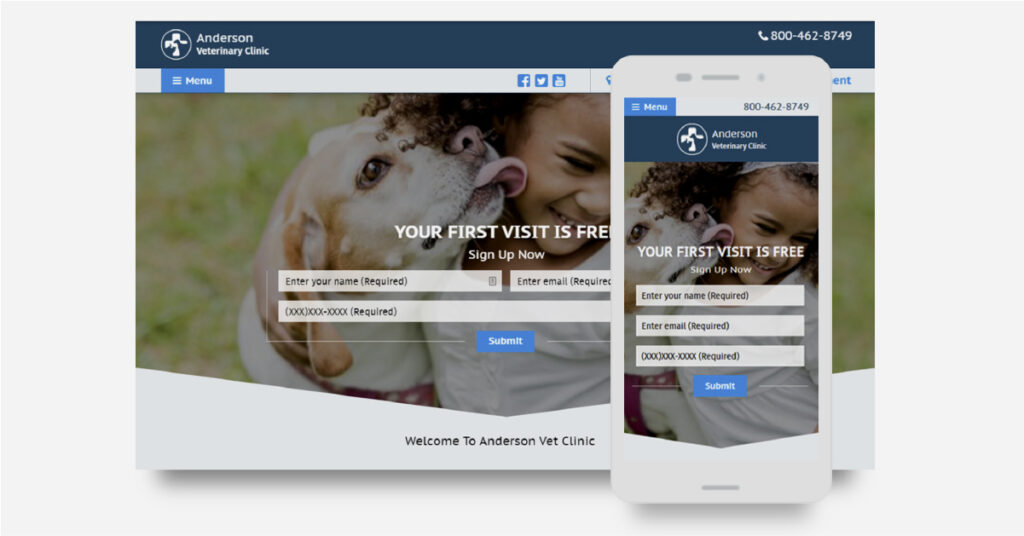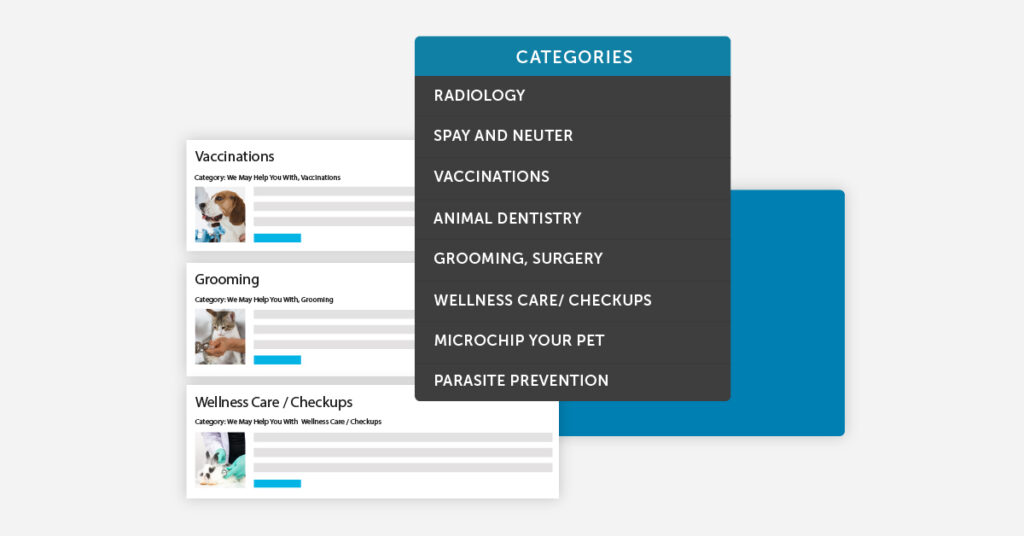Veterinary SEO: How to Improve Your Practice’s Local Ranking On Google
Pet owners rely on veterinarians like you to ensure their pets are taken care of properly and live long and healthy lives. When pet owners search online for a veterinary clinic, animal hospital, or pet grooming services the goal is to have your practice appear at the top of the search results. The higher you rank in the search results, the greater the likelihood that potential clients will find your veterinary practice. This process can be achieved with veterinary SEO, a specific digital marketing strategy.
According to Google search results, the first page receives 31% of all organic clicks, and the second-page results will only receive .78 percent of clicks. That’s a lot of clients you could be missing out on if you don’t rank on the first page of Google when pet owners search for your services.
The only way to avoid this? Find ways to improve your practice’s local ranking on Google. Your journey to learning the ins and outs of vet SEO for your practice starts here.

What is SEO?
Search engine optimization (SEO) is the process of optimizing a website’s content to make sure your practice shows up when people search online for veterinary care services (pet dental care, wellness examinations, vaccines, and surgery in your local area.
Keeping your veterinary practice optimized for search engines is a layered process. It requires the regular upkeep of your veterinary website and the implementation of a veterinarian SEO strategy, which will help your practice be known on the internet. Of course, you want your online presence to always look its best for any potential clients.
How Does Your Veterinary SEO Strategy Work?
The key to website upkeep and customer retention is to update your site frequently with fresh, unique, and informative veterinary content: add blogs that discuss pet home care, pet nutrition, and grooming, videos on how to groom your pet, or even how to give them their medication, informative clips on pet health, and articles from other pet care professionals, etc.
SEO helps drive traffic to your practice by using targeted strategies to help your business stay ahead of the curve and keep you on the first page of search engine results. It’s important to make an effort to constantly improve your vet SEO strategy and make it a part of your overall digital marketing plan. Most clients will only browse the first page of any search result, so keeping your most important information directly where most clients will be able to see it is crucial.
Watch Webinar: The Ultimate Guide to Get Your Veterinary Practice to the Top of Google

Have A Mobile-Friendly Veterinary Website
Before you invest in your site’s local SEO, first ensure that your website is mobile-friendly. There are two good reasons for this: most users are using their mobile devices to surf the web, so this is where most of your potential customers will be, and Google places a high priority on mobile interface friendliness in its local SEO rankings.
Nobody likes an amateur-looking site either: keep your site easy to navigate and pleasing to the eyes. Make all your text readable and make sure it contrasts against your site’s background, and try to keep from crowding the pages or keeping them too bare.
Add vet-specific content to your veterinary websites like pet care videos, grooming tips in a blog post or in a video form, advice from pet care professionals, or even a blog with advice for home pet care or home grooming.
There are many digital marketing providers that allow you to create not only a desktop site but a mobile site to mirror and optimize your content on mobile browsers. Remember to keep your content functional on all platforms. Pay attention to site elements such as URL structure, page organization, meta description, page titles, and title tags. Keeping these optimized will alert search engines to your website’s quality and influence its rank in search results.
Learn More: Why Your Veterinary Marketing Strategies Need to be Mobile-Focused
What are Keywords?
You might have heard the term ‘keywords’ get thrown a lot in the search engine optimization conversation. Keywords are one of the primary elements of vet SEO and allow your web content to be found via search engines and can be in the form of words or entire phrases. A well-optimized site will understand its potential client base and use the same terms they might use on search engines, allowing its site to connect with users.
Do Veterinary Keyword Research: Conduct A Local Search

To make keywords work for you, you need to understand what pet owners are looking for when they perform a Google search, like veterinary services, pet information, pet toys, food tips, and training methods. Narrowing down those terms will make it much easier for your potential clients to find you and your business on a search engine, even if there are other veterinary services in the area. Learning how to use local SEO strategies to rank well above the competition is a tried and tested veterinary marketing strategy and will hugely benefit your business.
Several free tools are available to research exactly which keywords will work for your veterinary practice, like searching up keywords for vet clinics on free sites like SerpWars, Answer the Public, Keyword Sheeter, etc.
The following keywords can help you connect with your ideal target market:
- veterinarian near me
- animal hospital
- animal clinic
- veterinary hospital
- veterinary clinic
These keywords are easy to rank for due to their commonality and have high search volumes because of the large number of pet owners in the US. This makes them a great starting point for your veterinarian search engine optimization journey.
Create Content That Potential Clients & Pet Owners Want To Know
A professional veterinary website should be neat, readable, fully functional, and contain an appropriate amount of pet informative content for site visitors. Not everyone who visits your site is going to be there to book an appointment. Some will have questions or need a second opinion from a professional or a website within the same industry. These include pet health queries or details about certain services.
The most frequently asked questions by pet owners include:
- How do I brush my pet’s teeth?
- How often should I give my pet a bath?
- What are easy ways to give my pet medication?
- How do I get my pet ready for their surgery?
- What kind of home care can I give my sick pet?
It would be a huge oversight not to include a way to answer these questions for your site visitors, especially since Google rewards sites based on user intent, which is answering questions. Try to have more of an edge over your local veterinary competition and veterinary social media, which is the go-to for most users in this current day and age, by focusing on content creation.
Blog Topic Ideas

Again, using the right keywords on your site will help your business connect to your potential clients. Try adding blogs, patient education, and videos. These are some of the most typically searched content types by internet users, and pet owners will sometimes want to learn from your site, thus driving more traffic to your website.
Listed below are some blog topics you could write about for your website:
- Pet weight loss
- Pet Nutrition
- Pet dental care
- Caring for aging pets
- Seasonal issues
- Moving pet stories
- Pet vaccines
Add Link Building & Backlinks

Link building is the practice of creating one-way hyperlinks, which are also known as backlinks, to your site to improve search engine visibility. There are a few ways to do this, including content marketing, email marketing, tools, and public relations.
For example, if you link a video from YouTube to your page, YouTube now has a backlink from your website. Backlinks are a vote of confidence to Google: if you have more of them, you’re more likely to show up in the relevant searches. As a veterinary practice, you should try to build backlinks to sites that are related to your practice, such as the American Veterinary Medical Association.
One way to improve your site’s visibility is to establish authority links from websites like the American Veterinary Medical Association, the FDA, and the like. Link building is crucial because even if you have created great content that clients will stick around to use, having no authoritative websites like vet associations won’t help your site rank well in the local SEO.

Optimize Your Google My Business
Google My Business is an online tool that will allow you to manage and optimize your business through Google. It’s crucial to create a Business Profile that will carry your veterinary practice’s relevant information and be the first thing new clients will see when searching for relevant terms on a search engine.
This is what appears in search results, including your location, business hours, and some reviews. This is where the ‘Local 3 Pack’ in Google Maps comes in: the Local 3 Pack is what Google calls the first three search results that come up as business profiles in a search result and, therefore, are the most visible. You can help your veterinary practice climb the local search and into the Local 3 Pack by using keywords that relate to the veterinary needs of your local area.
Keep in mind how veterinary SEO works and try to use phrases that pet owners will search for. A few examples of this are dental vet care, wellness exams, grooming services, pet vaccinations, and more.
You can also attach keywords to your Business Profile, which will make it even easier for your patients to see you and let you stand out from other veterinary practices. Try adding keywords related to the services you offer, like pet dental care, pet hospital, an animal hospital, or pet vaccines.
Let Us Help You Get Found Online By Your Ideal Pet Patients
Let us show you how VetMatrix stands out among other veterinary marketing companies and help you bring in your ideal potential clients and connect them with the services you offer. We can take care of all your marketing needs by offering you a personalized approach with our veterinarian SEO services to improve your search engine rankings without breaking the bank.
Learn more about our marketing services by giving our SEO experts a call at 888.792.8384 or click here to get special pricing.



